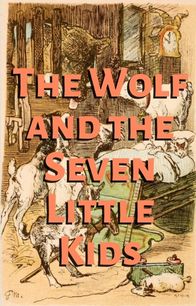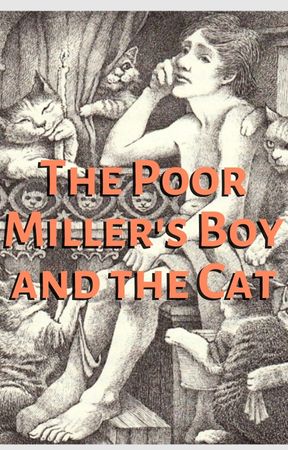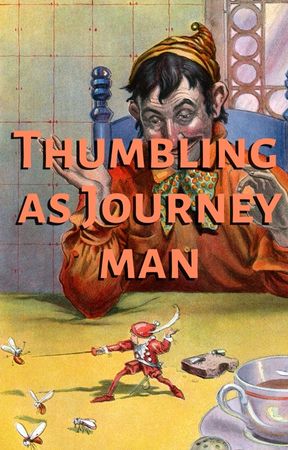There was once on a time a hermit who lived in a forest at the foot of a mountain, and passed his
time in prayer and good works, and every evening he carried, to the glory of God, two pails of
water up the mountain. Many a beast drank of it, and many a plant was refreshed by it, for on the
heights above, a strong wind blew continually, which dried the air and the ground, and the wild
birds which dread mankind wheel about there, and with their sharp eyes search for a drink. And
because the hermit was so pious, an angel of God, visible to his eyes, went up with him, counted
his steps, and when the work was completed, brought him his food, even as the prophet of old
was by God’s command fed by the raven. When the hermit in his piety had already reached a
great age, it happened that he once saw from afar a poor sinner being taken to the gallows. He
said carelessly to himself, “There, that one is getting his deserts!” In the evening, when he was
carrying the water up the mountain, the angel who usually accompanied him did not appear, and
also brought him no food. Then he was terrified, and searched his heart, and tried to think how
he could have sinned, as God was so angry, but he did not discover it. Then he neither ate nor
drank, threw himself down on the ground, and prayed day and night. And as he was one day thus
bitterly weeping in the forest, he heard a little bird singing beautifully and delightfully, and then
he was still more troubled and said, “How joyously thou singest, the Lord is not angry with thee.
Ah, if thou couldst but tell me how I can have offended him, that I might do penance, and then
my heart also would be glad again.” Then the bird began to speak and said, “Thou hast done
injustice, in that thou hast condemned a poor sinner who was being led to the gallows, and for
that the Lord is angry with thee. He alone sits in judgement. However, if thou wilt do penance
and repent thy sins, he will forgive thee.” Then the angel stood beside him with a dry branch in
his hand and said, “Thou shalt carry this dry branch until three green twigs sprout out of it, but at
night when thou wilt sleep, thou shalt lay it under thy head. Thou shalt beg thy bread from door
to door, and not tarry more than one night in the same house. That is the penance which the Lord
lays on thee.”
Then the hermit took the piece of wood, and went back into the world, which he had not seen for
so long. He ate and drank nothing but what was given him at the doors; many petitions were,
however, not listened to, and many doors remained shut to him, so that he often did not get a
crumb of bread.
Once when he had gone from door to door from morning till night, and no one had given him
anything, and no one would shelter him for the night, he went forth into a forest, and at last found
a cave which someone had made, and an old woman was sitting in it. Then said he, “Good
woman, keep me with you in your house for this night;” but she said, “No, I dare not, even if I
wished, I have three sons who are wicked and wild, if they come home from their robbing
expedition, and find you, they would kill us both.” The hermit said, “Let me stay, they will do no
injury either to you or to me.” and the woman was compassionate, and let herself be persuaded.
Then the man lay down beneath the stairs, and put the bit of wood under his head. When the old
woman saw him do that, she asked the reason of it, on which he told her that he carried the bit of
wood about with him for a penance, and used it at night for a pillow, and that he had offended the
Lord, because, when he had seen a poor sinner on the way to the gallows, he had said he was
getting his deserts. Then the woman began to weep and cried, “If the Lord thus punishes one
single word, how will it fare with my sons when they appear before him in judgment?”
At midnight the robbers came home and blustered and stormed. They made a fire, and when it
had lighted up the cave and they saw a man lying under the stairs, they fell in a rage and cried to
their mother, “Who is the man? Have we not forbidden any one whatsoever to be taken in?”
Then said the mother, “Let him alone, it is a poor sinner who is expiating his crime.” The
robbers asked, “What has he done?” “Old man,” cried they, “tell us thy sins.” The old man
raised himself and told them how he, by one single word, had so sinned that God was angry with
him, and how he was now expiating this crime. The robbers were so powerfully touched in their
hearts by this story, that they were shocked with their life up to this time, reflected, and began
with hearty repentance to do penance for it. The hermit, after he had converted the three sinners,
lay down to sleep again under the stairs. In the morning, however, they found him dead, and out
of the dry wood on which his head lay, three green twigs had grown up on high. Thus the Lord
had once more received him into his favour.
From Jacob and Wilhelm Grimm, Household Tales, trans. Margaret Hunt
(London:
George Bell, 1884), 2:366-368.















